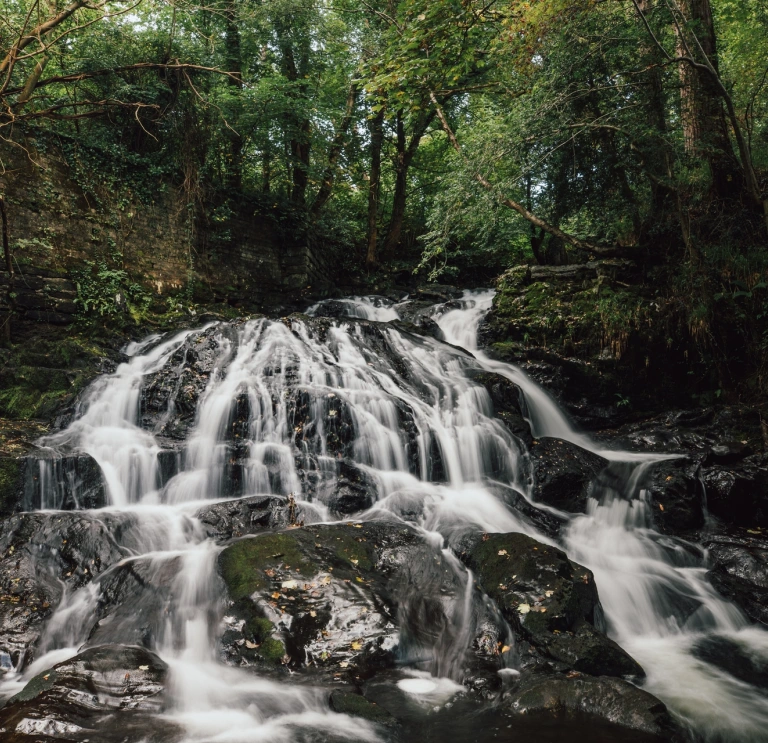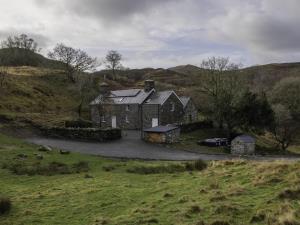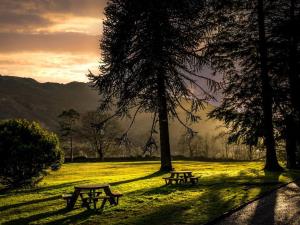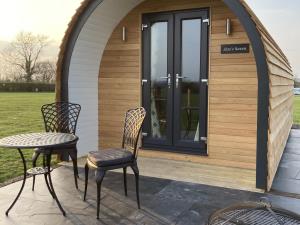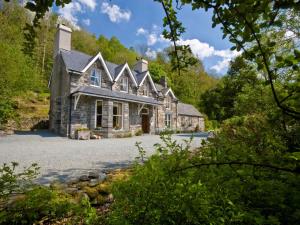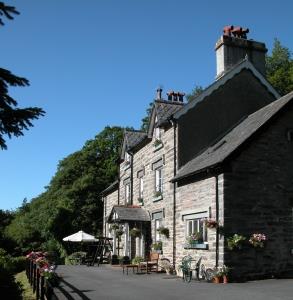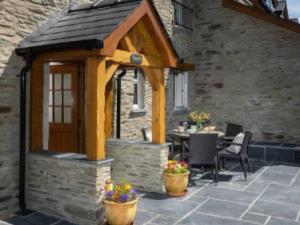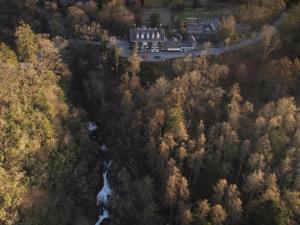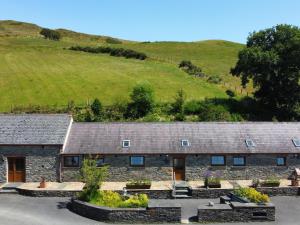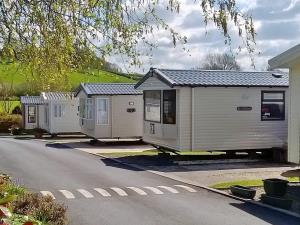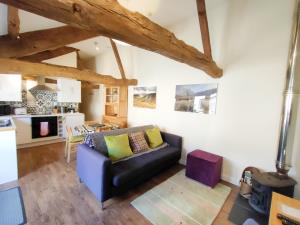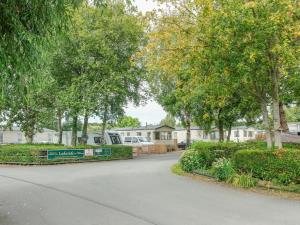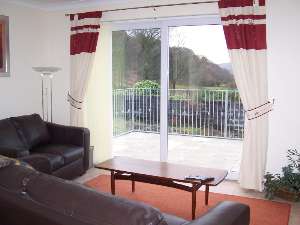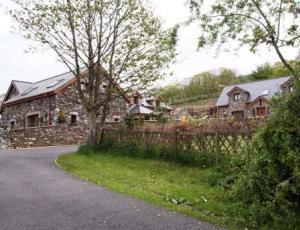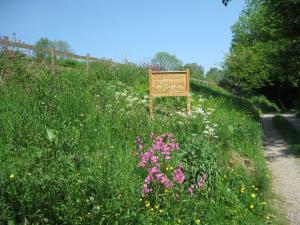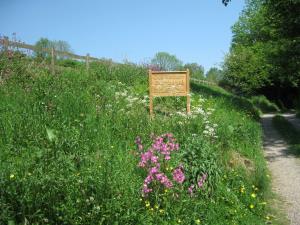Let's talk about 'the waterfall effect'. It's all about negative oxygen ions. When water bashes against itself, it releases zillions of these little mood-boosters into the air. Breathing them in makes you happier and more alert.
And because we care about your happiness, here are some of our waterfall hidden gems. They’re not necessarily the biggest or showiest or most famous. A couple of them are quite tricky to find, or may involve a stiff walk. Others are easily accessible to everyone.
You can visit at any time of year, but waterfalls in Wales are best enjoyed outside peak summer season. They’re often at their finest in spring, when wildlife is at its most active. Or in autumn, as the forests turn gold and red, and migratory fish leap upstream to their spawning grounds. Winter has its own dramatic power, with rivers in full roar behind a curtain of icicles.
Whenever you visit, do be sure to take care of yourself and the landscape: there’s plenty of great advice at AdventureSmart and the Countryside Code.
So let’s get happy…
Waterfalls across Wales
North Wales waterfallsNorth
Rhaeadr Ddu, Ganllwyd, Gwynedd
A series of waterfalls tumble down the River Gamlan, but Rhaeadr Ddu is both the most handsome and the easiest to reach. The National Trust have plotted waymarked routes of varying lengths, so you can spend an hour or three exploring the river, the lovely woodland of the Coed Ganllwyd National Nature Reserve, and the remains of the Cefn Coch gold mine.
Essentials: It’s really easy to find – the car park is right on the A470, and there’s a public toilet. The walking routes are mostly flat too, so it’s family friendly.
Pistyll Gwyn, Gwynedd
The waterfall is one of the highlights of the Graigddu Woods - a gloriously lonesome walk across moorland and woodland, past the ruined remains of forestry workers’ cottages, with the Rhinog mountain range looming ahead of you. Pistyll Gwyn is about a mile from the car park, but there’s the Bwlch Drws Ardudwy circuit option if you fancy getting further into the wild.
Essentials: The starting point is tricky to find. You’re looking for a gated road off the A470, about half a mile south of Bronaber. Follow this lane across the moors for a couple of miles to the free car park.
Nantcol Waterfalls, Gwynedd
The owners of Nantcol Waterfalls, nestled in beautiful farmland, have devised a range of woodland and river walks, ranging from 10-minute toddles to 90-minute ambles, all beginning from their car park. Bear in mind that it’s both a campsite (so there’ll be people) and a working sheep farm (so keep your dog on a lead).
Essentials: The River Cwmnantcol soon joins the River Artro before reaching the sea at Mochras. Nearby attractions include Shell Island and the Morfa Dyffryn nature reserve.

Rhaeadr Dyserth, Denbighshire
Dyserth’s waterfall is much easier to find. It obligingly plummets over a limestone cliff more or less in the centre of this pretty village, set in the Clwydian Range Area of Outstanding Natural Beauty. Remarkably - and by today’s standards, scandalously - the waterfall completely dried up during the Industrial Revolution, as water was diverted to local mills and mines. Dyserth got its waterfall back in the late 19th century, and it has been flowing ever since.
Essentials: No hiking gear necessary to enjoy this waterfall, unless you want to use it as a starting point for a yomp up to the Moel Hiraddug hill fort.

Fairy Falls, Conwy
Or Rhaeadr y Tylwyth Teg, as we say in Welsh. The River Crafnant scurries through the village of Trefriw, where you’ll find easy parking. It takes less than 10 minutes to walk down to the pretty falls, so it’s worth carrying on through the woods to find minor cascades further downstream. For a properly long walk, carry on to the lakes Llyn Geirionydd and Llyn Crafnant. Back at the village, you can refresh yourself at the Fairy Falls Hotel, and visit Trefriw Woollen Mills.
Essentials: The footpath to the falls isn’t immediately obvious; it’s tucked just up Chapel Hill, opposite the hotel.

Conwy Falls, Conwy
The twin falls at Conwy Falls Forest Park are the centrepiece of a 10-acre nature reserve that forms part of Fairy Glen, a deep gorge that runs down from Betws-y-Coed through ancient woodland. The falls’ Welsh name, Rhaeadr y Graig Lwyd, means ‘waterfall of the grey rock’. They’ve deliberately kept the pathways and viewpoints as natural as possible, so it’s a little tricky underfoot in some place. Bring a picnic, or let the on-site Conwy Falls Café revive you.
Essentials: There’s a modest charge to access the park, currently £2 (exact cash or card) for adults, payable at the turnstiles next to the café.


Swallow Falls (Rhaeadr Ewynnol), Conwy
Just off the A5 west of Betws-y-Coed, Swallow Falls or Rhaeadr Ewynnol, is a stunning 42-metre high waterfall on the Afon Llugwy. Surrounded by native woodlands within the magical Gwydir Forest, it's one of the most popular attractions in the area. The falls squeeze down a craggy limestone gorge before fanning out into a 'swallow wings' shape. The strenuous Swallow Falls Walk is a great way to explore the forest, or head to the viewing platforms if you just want to admire the falls. Head over after heavy rainfall in autumn or springtime to see the spectacular sight in full flow.
Essentials: Parking is available along the roadside, or catch the Sherpa'r Wyddfa S1 or the T10 Trawscymru bus services. It's £2 entry (cash or card) to access the viewing platforms.

Mid Wales waterfallsMid
Hafod, Ceredigion
Now in the safe hands of the National Trust, the Hafod Estate occupies 200 idyllic hectares in the upper Ystwyth Valley estate. Nature had already done a cracking job of the scenery, but its 18th-century owners subtly enhanced and adorned the landscape in the ‘picturesque’ style. They also created walking routes to show it all off, including the strenuous Gentleman’s Walk and the less taxing Lady’s Walk (names which wouldn’t be tolerated nowadays, clearly). All walks take in series of lovely waterfalls, the biggest of which are Rhaeadr Peiran and Mossy Seat Falls.
Essentials: Its most unusual waterfall, Cavern Cascade, is closed for safety reasons at time of writing. Its Welsh name, Lefel Lampwll, hints that the cave was originally made by miners.



Furnace Falls, Ceredigion
Just upstream from the historic Dyfi Furnace, the River Einion crashes down thumping great falls whose power was harnessed by the furnace and, later, sawmills. While you’re there, it’s worth ambling further up the stunningly lovely Cwm Einion, a favourite bolthole of Led Zeppelin singer Robert Plant. The nearby RSPB Ynys-hir Nature Reserve is also worth a visit – the BBC filmed their popular Springwatch series there a few years back.
Essentials: The nearest restaurant isn’t too shabby, either. Two-Michelin-starred Ynyshir Restaurant and Rooms was recently named the best restaurant in Britain. It’s astonishingly good. Community-owned Cletwr shop and café in nearby Tre'r Ddol offers a decent cuppa and cake.
Cenarth Falls, Ceredigion
The River Teifi runs right through the pretty village of Cenarth, marking the border between two Welsh counties. On the Ceredigion side, there’s an easy Cenarth circular walk, with an accessible boardwalk along the river bank, while the Carmarthenshire bank’s attractions include the National Coracle Centre and Saint Llawddog's Holy Well. But the star attraction is undoubtedly the falls themselves, which step picturesquely down in a series of cascades. In the autumn, it’s a great place to see migratory salmon and sewin leap up the falls to reach their spawning grounds.
Essentials: There’s a good car park (around £3) and because the falls are more or less in the middle of the village, plenty of places to eat, drink and shop.


Rheidol Falls, Ceredigion
The Vale of Rheidol steam railway chugs up the 12 miles from Aberystwyth to Devil’s Bridge through ancient sessile oak and birch forests. The Devil’s Punchbowl and Mynach Falls are the biggest draw, but canny walkers get off at the Rheidol Falls stop to explore the less visited cascades (there’s a great route map on the Vale of Rheidol website – see walk number 4). As a bonus, the walk includes Cwm Rheidol Reservoir, the fish ladder, and a tour of the Rheidol Visitor Centre and Power Station if you have time (needs to be booked in advance).
Essentials: The train runs from March to November. This is wild country, so the walking can be a bit challenging, especially in winter.
Devil’s Bridge Falls, Ceredigion
Welsh folklore will tell you that the devil built a stunning bridge over this waterfall and was later outwitted by a local woman and banished from the country forever. Two separate walks wind their way up beside the waterfall, where hundreds of slate steps lead to a variety of viewing platforms. And for any Hinterland fans out there, you might recognise a few of the locations; Devil’s Bridge was the setting for and name of the first ever episode. The waterfall is around 12 miles from the historical harbour town Aberystwyth.
Essentials: There's a free car park near the entrance, or travel up by steam power. The Vale of Rheidol Railway station at Devil's Bridge is a 4 minute walk from the falls - check their timetable to make sure you have enough time to do the walk though!



Water-Break-its-Neck, Powys
Could there be a better name for a waterfall? It’s probably a literal translation of the Welsh Dŵr-Torri-Gwddf - there’s a similarly-named waterfall in the upper reaches of the Severn/Hafren. This one tumbles down a cliff in Warren Wood, so-named because of the rabbits that provided a local source of food. It’s part of the wider Radnor Forest, which was once a royal hunting ground. There’s decent parking and plenty of waymarked trails.
Essentials: It’s best visited after a good dose of rain, because the falls can become a mere trickle after a long dry spell.
Bannau Brycheiniog (Brecon Beacons), Powys
We’re focusing on the unsung heroes of the waterfall world here, but it’d be daft not to mention the little corner of the Bannau Brycheiniog (Brecon Beacons) known as Waterfall Country, which has the greatest concentration of cascades, caves and gorgeous gorges anywhere in Britain. The waterfalls here are not close to the car parks, so to reach them requires a long walk on uneven terrain.
Essentials: Popularity comes at a cost. In peak season, it can be tricky to park, and you won’t have the place to yourself. So plan your trip in advance and visit off-peak if you can. We recommend you use the free park and ride service from Glynneath to Pontneddfechan and Gwaun Hepste car park where possible. The service usually runs on Saturdays, Sundays and Bank Holiday Monday between July and September.


West Wales waterfallsWest
Melincourt Falls, Neath Port Talbot
Because it’s slightly outside the main Waterfall Country area, Melincourt tends to be neglected by visitors. This is great news for those in the know, because it’s a banger: easy to reach from the car park, and spectacular when you get there. The 80ft / 24m falls create a humid microclimate that supports rare ferns and plenty of bird life. Just above it are the substantial remains of an 18th century iron works.
Essentials: Although it’s little more than 10 minutes from the car park, the path is narrow and ascends steadily. And by the way, its Welsh name is Sgwd Rhyd Yr Hesg: ‘ford of the rushes waterfall’.

Aberdulais Falls, Neath Port Talbot
You get two brilliant attractions in the same spot at the Aberdulais Tinworks and Waterfall. The powerful Dulais Valley waterfalls cascade down steep cliffs and rocks through a gorge before emptying into the River Neath. These mighty forces were used for centuries to power industry – originally copper smelting, then tin, textiles and grain. The waterfalls now power a huge electricity generating waterwheel (currently undergoing maintenance). Look around the Turbine House, enjoy the interactive displays, take a tour around the remains of the 19th-century tinplate works and visit the National Trust gift shop.
Essentials: The falls are even better after a decent rainfall! There are level pathways around the site, it's also dog-friendly (on short leads), and there's parking and accessible toilets nearby.


South Wales waterfallsSouth
Clydach Gorge, Monmouthshire
It lies within the Bannau Brycheiniog (Brecon Beacons) National Park, but Clydach Gorge is close enough to the South Wales coalfield to have made it a prime target for industrial revolutionists, who exploited the brute power of the river for ironworks and quarries. Nowadays these are picturesque ruins in woodlands, and the Clydach Gorge, which runs roughly from Gilwern down to the RSPB Cwm Clydach Nature Reserve, has been reclaimed by nature. Some of its many waterfalls are tricky to reach – the gorge is simply too deep ‘n’ steep – but they’re easily viewed from the footpath. There’s walking and cycling route map on the Sustrans website, and a walking guide on the UK Southwest website.
Essentials: The most intimate way to get acquainted with Clydach’s waterfalls is to join a gorge scrambling group, who climb several of the falls as part of adventure trips.
Blue Pool / Pwll Glas, Merthyr Tydfil
The picnic site at Pwll Glas is the perfect place to finish a country walk, where the waters of the Taf Fechan cascade gently into the pool. Great walks are offered by the Taf Fechan nature reserve, which you could combine with a stiffer hike up to the remains of Morlais Castle, built during a squabble between two Norman barons.
Essentials: The Taf Fechan and its slightly bigger brother, the Taf Fawr, rise a few miles apart in the Bannau Brycheiniog (Brecon Beacons). They meet at Merthyr Tydfil to form the River Taff, which flows to the sea through central Cardiff.


